Uncover the Mystical Beauty of Wuyi Mountains: Your Ultimate Travel Guide
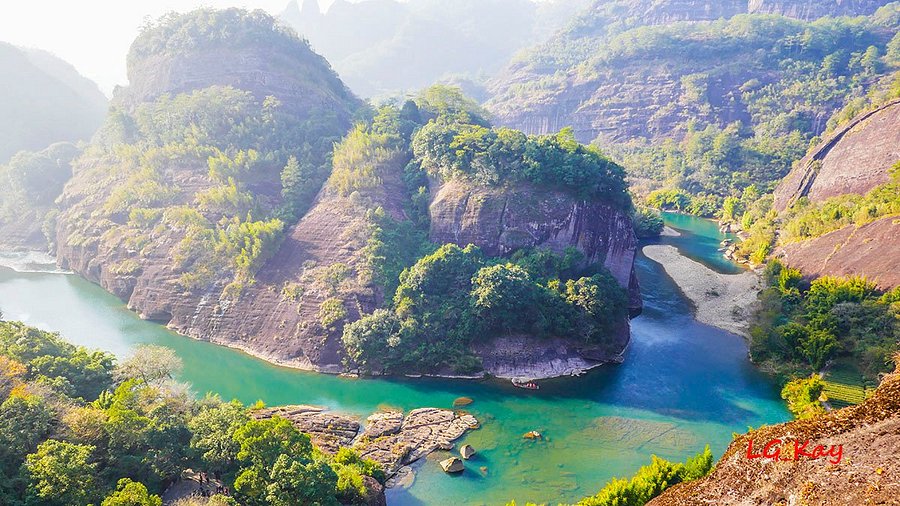
An Essential Guide to Visiting Wuyi Mountains
Nestled between the rich landscapes of Fujian and Jiangxi provinces, the Wuyi Mountains (武夷山) stand as a breathtaking testament to nature’s artistry and cultural significance. Recognized as a UNESCO World Cultural and Natural Heritage Site, this majestic range is a paradise for outdoor enthusiasts, tea lovers, and anyone seeking a retreat into the tranquility of lush forests, deep canyons, and cascading waterfalls.
As you traverse the winding paths and navigate the iconic Nine-Bend Creek, you’ll discover a world where ancient history meets vibrant ecosystems. Each bend reveals its own picturesque landscape, inviting you to pause and soak in the beauty that surrounds you. From the awe-inspiring heights of Tianyou Peak, often shrouded in ethereal clouds, to the serene bamboo raft rides that glide along the crystal-clear waters, the Wuyi Mountains offer a unique experience in every season.
Whether you’re keen on hiking, exploring the rich heritage of Taoist temples, or sampling the renowned Da Hong Pao tea—one of China’s most celebrated brews—this enchanting destination promises a journey that captivates your senses and invigorates your spirit. With distinct seasonal charms, there’s no wrong time to visit; each month brings its own reasons to return. Prepare to embark on an unforgettable adventure, where the stunning vistas and rich cultural tapestry of the Wuyi Mountains await to be explored!
In This Guide
- An Essential Guide to Visiting Wuyi Mountains
- The Rich History and Legends of Wuyi Mountains
- Main Highlights: What You Absolutely Can’t Miss
- Planning Your Visit: A Practical Guide
- Tickets: Prices, Booking, and Tips
- How to Get There: A Complete Transportation Guide
- Local Cuisine and Accommodation Nearby
- Frequently Asked Questions
- Final Thoughts on Your Trip
The Rich History and Legends of Wuyi Mountains
The Wuyi Mountains, a stunning expanse of nature nestled between Fujian and Jiangxi provinces, are steeped in rich history and lore. Recognized as a UNESCO World Cultural and Natural Heritage Site, these mountains not only offer breathtaking landscapes but also a tapestry of stories that span thousands of years.
Historically, the Wuyi Mountains have served as a cultural and political hub since ancient times. The area has been inhabited for over 5,000 years, with archaeological evidence indicating that it was home to various ethnic groups long before the establishment of the Han Dynasty in 206 BC. The lush environment provided a sanctuary for early settlers, who were drawn to the fertile lands and abundant resources.
During the Tang (618-907 AD) and Song (960-1279 AD) dynasties, the Wuyi Mountains blossomed into a center of cultural significance. Scholars and poets ventured here to seek inspiration among the tranquil landscapes. The region became a cradle for Confucianism and Taoism, with numerous temples and monasteries dotting the mountainsides. Among these, the Wuyi Palace stands out, constructed during the Song Dynasty as a prominent Taoist temple. It is not only a spiritual sanctuary but also a testament to the architectural prowess of the era, drawing visitors with its traditional wooden structures and serene ambiance.
Legends entwined with these mountains add a mystical layer to their allure. One of the most famous tales is that of the “Tiger Hissing Peak,” named for its distinct shape resembling a roaring tiger. Local lore claims that a deity rode upon a tiger through the mountains, and the echoes of the wind through the pine forests create sounds reminiscent of a tiger’s hiss. This picturesque peak is not just a feast for the eyes; it is steeped in myth, inviting travelers to immerse themselves in the enchanting stories of the past.
The Wuyi Mountains are also celebrated for their legendary tea, the Da Hong Pao, which translates to “Big Red Robe.” This tea has a storied history, said to have been used as a tribute to emperors during the Ming Dynasty. The original Da Hong Pao trees, found on cliffs in the region, are over a thousand years old and are revered as national treasures. Folklore suggests that a scholar’s mother was cured of an illness by drinking this remarkable tea, which led to its esteemed status and further legends about its miraculous properties.
Another important aspect of the Wuyi Mountains’ history is its connection to the Chinese literary tradition. The mountains have inspired countless poets and writers, becoming a muse for their works. The picturesque scenery and peaceful atmosphere continue to draw artists and literary figures, who find solace and creativity in the enchanting surroundings.
The rich history and legends of the Wuyi Mountains have woven a complex narrative that continues to captivate all who visit. Whether you are exploring ancient temples, hiking the rugged trails, or sipping a cup of the legendary Da Hong Pao tea, the stories of the past are palpable in every corner of this extraordinary landscape. As you traverse this majestic region, you become part of a living heritage that has flourished for centuries, making your journey not just a trip, but a passage through time itself.
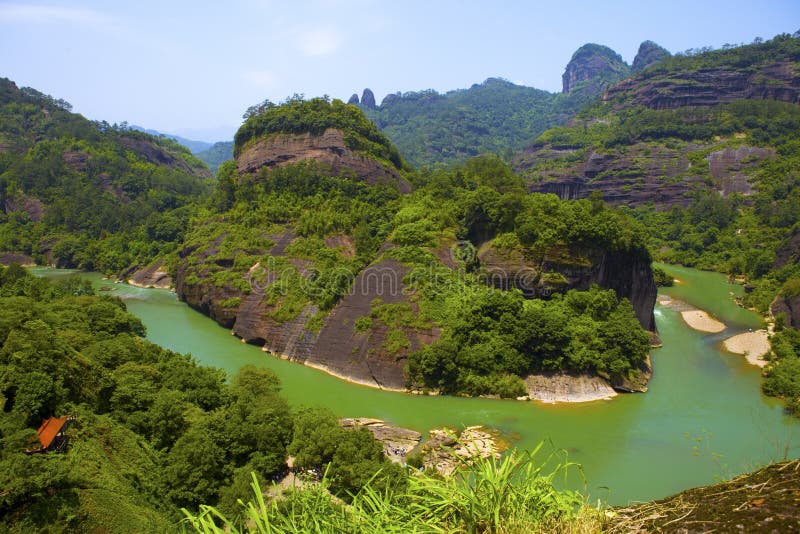
Wuyi Mountains.
Main Highlights: What You Absolutely Can’t Miss
The Wuyi Mountains, a UNESCO World Cultural and Natural Heritage Site, offer an enchanting escape into nature and history, nestled between Fujian and Jiangxi provinces. This majestic mountain range is a treasure trove of stunning landscapes, rich biodiversity, and cultural significance. Here’s a guide to the main highlights that you absolutely cannot miss during your visit.
Nine-Bend River and Wuyi Palace Scenic Area
Nine-Bend Creek (九曲溪) is the crown jewel of the Wuyi Mountains, renowned for its serpentine twists and turns. As you glide along the creek on a bamboo raft, prepare to be mesmerized by the dramatic scenery that unfolds at each bend. The area is flanked by unique rock formations and lush greenery, creating a picturesque landscape. Don’t miss the Green Dragon Waterfall and Phoenix Waterfall, where you can marvel at the cascading waters and explore nearby caves for an unforgettable experience.
At the end of your rafting journey, you’ll arrive at Wuyi Palace, one of the most significant Taoist temples built during the Song Dynasty. Take a stroll down Song Street, a charming replica of medieval architecture that transports you back in time.
One-Line-Sky and Tiger Hissing Scenic Areas
The One-Line-Sky (一线天) area presents a breathtaking view of the sky from the depths of a grand valley. The steep, rugged peaks, including Blue Rock and Pavilion Rock, offer stunning backdrops for photography enthusiasts. This area is a testament to nature’s artistry, featuring Danxia landforms that are both dramatic and beautiful.
A short distance away, Tiger Hissing Peak (虎啸岩) captivates visitors with its sheer cliffs and the sounds of wind rushing through the pines, reminiscent of a tiger’s roar. Legend has it that a deity once rode a tiger here, adding to the peak’s mystique. Hiking around this area rewards you with sweeping views and a sense of adventure.
Tianyou Peak
Tianyou Peak (天游峰), or “Sky-Swimming Peak,” is a must-see for any traveler. The peak offers panoramic views that change with the seasons. In spring, the surrounding flowers burst into bloom, while summer brings vibrant greenery. The autumn foliage is nothing short of spectacular, and winter often cloaks the landscape in a mystical fog. Ascending this peak is highly recommended for those seeking the best vistas the Wuyi Mountains have to offer.
Water Curtain Cave Area
Explore the Water Curtain Cave (水帘洞), the largest cavern in the Wuyi Mountains, where nature’s wonders continue to unfold. This enchanting cave is filled with creeks and waterfalls that flow through its rocky crevices. A variety of flora, including the famous Wuyi Rock Tea trees, thrive in this lush environment. Some delightful tearooms within the cave allow you to savor the local tea while soaking in the natural beauty around you.
Da Hong Pao Scenic Area
In the central part of the mountains lies the Da Hong Pao Scenic Area, home to the legendary Da Hong Pao tea—one of China’s most revered teas. Visit the Yongle Buddhist Temple, the largest temple in the region, and learn about the fascinating history of the tea that was once a tribute to the Ming Dynasty emperors. The ancient tea trees, over 1,000 years old, can still be seen growing on the cliffs, a living testament to the area’s rich cultural heritage.
Conclusion
Whether you are an avid hiker, a tea enthusiast, or simply a lover of breathtaking landscapes, the Wuyi Mountains promise a memorable adventure. With its diverse attractions—from the scenic beauty of Nine-Bend Creek to the cultural richness of Da Hong Pao—this destination offers something for everyone. Make sure to set aside ample time to explore and immerse yourself in the natural wonders and historical treasures of this remarkable region.
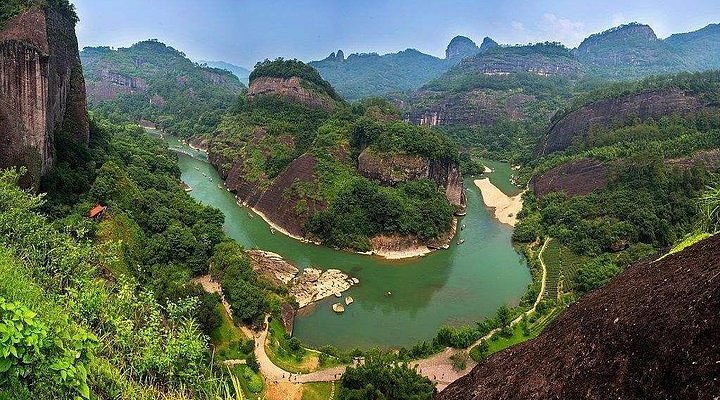
Wuyi Mountains.
Planning Your Visit: A Practical Guide
Your Essential Guide to Visiting the Wuyi Mountains
Embarking on a journey to the Wuyi Mountains promises a blend of adventure, breathtaking scenery, and cultural richness. This UNESCO World Heritage Site, straddling Fujian and Jiangxi provinces, offers a plethora of experiences for nature lovers, history enthusiasts, and those seeking a serene escape. Here’s everything you need to know for a memorable visit.
Best Times to Explore
The Wuyi Mountains exhibit distinct seasonal beauty, making it a year-round destination. Here’s a brief overview of what to expect during each season:
-
Spring (Late March to May): Ideal for witnessing blooming tea plantations and vibrant flowers. Average temperatures range from 15 to 25°C (59–77°F).
-
Summer (June to August): Experience the lush greenery and retreat from the heat. Temperatures can soar to 34°C (93°F), so plan indoor activities during the hottest hours.
-
Autumn (September to Mid-November): The foliage transforms into a stunning array of red leaves, perfect for hiking. Average temperatures are a comfortable 15–25°C (59–77°F).
-
Winter (Mid-November to Mid-March): Enjoy a quieter experience with foggy landscapes and potential light snow. Temperatures are mild, averaging 5 to 10°C (41–50°F).
Getting to the Wuyi Mountains
Accessible by both high-speed trains and flights, reaching Wuyi Mountain is straightforward:
-
Train: High-speed trains connect Wuyishan to major cities like Shanghai (3½ hours), Hangzhou (2½ hours), and Xiamen (3½ hours). Two main railway stations serve the area: Wuyishan North and Nanping, both about 28 km (17 miles) from the scenic area.
-
Flight: While fewer options exist, direct flights from Beijing and Guangzhou land at Wuyishan Airport, just 12 km (8 miles) from the mountains.
Accommodations
Staying near the scenic area enhances your visit, with three primary regions offering varied accommodations:
- Sangu Resort Area: Just 3 km (2 miles) from the entrance, this area boasts numerous hotel options, from luxurious 5-star establishments to cozy inns. Recommended choices include:
- Wyndham Garden Wuyishan (5-star)
-
Days Hotel by Wyndham Yinxiang Wuyishan (4-star)
-
Xingcun Village: A 10-minute walk from the Nine-Bend River, it’s perfect for early risers wanting to maximize their time. Top hotels include:
- Wuyi Mountain Jooch Resort Hotel (5-star)
- Yuejiuqu Boutique Hotel Wuyishan (4-star)
Planning Your Itinerary
To fully embrace what the Wuyi Mountains offer, a 2-3 day itinerary is recommended. Here’s a suggested three-day plan:
-
Day 1: Arrive in Wuyishan and explore the One-Line-Sky Scenic Area. If time allows, visit the Tiger Hissing Scenic Area.
-
Day 2: Spend your day in the Da Hong Pao and Water Curtain Cave Area. Don’t miss a tour of a local tea plantation.
-
Day 3: Enjoy a bamboo rafting adventure on the Nine-Bend Creek. If your departure allows, hike Tianyou Peak before saying farewell.
Activities and Attractions
The Wuyi Mountains are rich in natural wonders and cultural heritage. Key highlights include:
-
Nine-Bend Creek: Famous for its stunning landscapes and bamboo rafting.
-
Tianyou Peak: A must-see for panoramic views that change with the seasons.
-
Da Hong Pao Scenic Area: Home to the legendary tea trees and the Yongle Buddhist Temple.
-
Water Curtain Cave: Explore the largest cavern filled with picturesque rock formations and lush vegetation.
Additional Tips
-
Entrance Fees: Tickets for the Wuyi Mountain National Scenic Area range from 140 to 160 yuan for single-day passes, with additional costs for bamboo rafting and other attractions.
-
Transportation: Shuttle buses operate within the scenic area, making it easy to navigate between sights.
-
Local Cuisine: Don’t miss trying local delicacies, especially tea-based dishes, while you’re in the area.
Cultural Experiences
Consider extending your trip to explore nearby attractions such as Xiamen’s Gulangyu Island or the Hakka Tulou earthen buildings, both providing rich cultural contexts and stunning scenery.
With its stunning landscapes and rich cultural tapestry, the Wuyi Mountains offer an unforgettable experience for every traveler. Prepare to be enchanted by its natural beauty and embrace the tranquility that this remarkable destination provides. Happy travels!
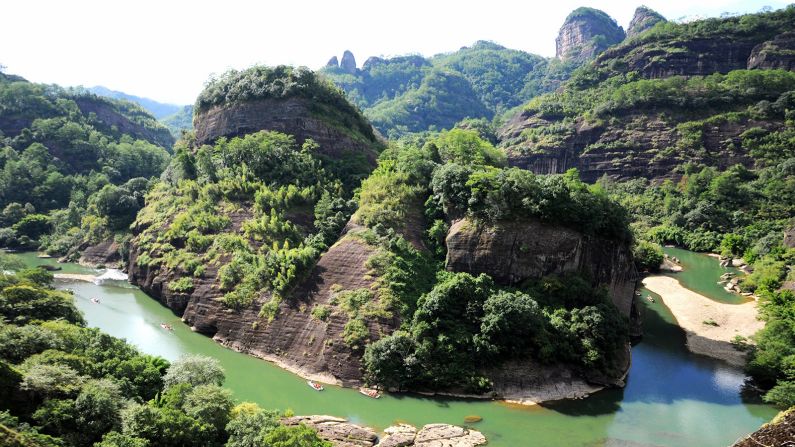
Wuyi Mountains.
Tickets: Prices, Booking, and Tips
Visiting the breathtaking Wuyi Mountains is an unforgettable experience, and understanding the ticketing options is essential for planning your adventure. The entrance tickets for the Wuyi Mountain National Scenic Area come with several passes, each catering to different lengths of stay and exploration preferences. Here’s a detailed overview of the ticket prices, shuttle bus fees, and some helpful tips for booking your tickets.
Ticket Prices
- One Day Pass:
- Entrance: 140 yuan
- Shuttle Bus Fee: 75 yuan
-
Total: 215 yuan
-
Two Day Pass:
- Entrance: 150 yuan
- Shuttle Bus Fee: 85 yuan
-
Total: 235 yuan
-
Three Day Pass:
- Entrance: 160 yuan
- Shuttle Bus Fee: 90 yuan
-
Total: 250 yuan
-
Bamboo Rafting: 100 yuan
- Green Dragon Waterfall Entrance: 40 yuan
Booking Tips
-
Plan Ahead: It’s advisable to book your tickets in advance, especially during peak seasons (spring and autumn) when the mountains attract many visitors. This will not only ensure availability but also save you time at the entrance.
-
Consider Shuttle Services: The scenic area is expansive, and shuttle buses are available to transport you between attractions. The shuttle bus fee is included in the ticket prices, making it convenient to explore without the hassle of walking long distances.
-
Choose the Right Pass: Depending on your itinerary, you might want to opt for either a one, two, or three-day pass. Most travelers find that a three-day pass allows for a more leisurely exploration of the stunning landscapes and cultural sites.
-
Enjoy Bamboo Rafting: Don’t miss the chance to experience bamboo rafting on Nine-Bend Creek, a highlight of any visit to the Wuyi Mountains. Be sure to budget the additional 100 yuan for this unique activity.
-
Entry Restrictions: Keep in mind that there are no cable cars available in the park. However, the hiking trails are manageable, making it accessible for most visitors.
Final Thoughts
A trip to the Wuyi Mountains promises a deep connection with nature, rich cultural history, and stunning scenery. By understanding the ticketing options and planning accordingly, you can maximize your experience in this UNESCO World Heritage Site. Whether you choose to hike, raft, or simply soak in the views, the Wuyi Mountains await your exploration!
How to Get There: A Complete Transportation Guide
Reaching the stunning Wuyi Mountains, a UNESCO World Heritage Site, is relatively straightforward, thanks to the efficient transportation options available in China. Whether you’re arriving from major cities or exploring nearby regions, here’s your comprehensive guide to getting to this breathtaking destination.
By Train
The high-speed rail network in China is a fantastic way to travel, and the Wuyi Mountains are well connected. The two primary railway stations serving Wuyishan are Wuyishan North Railway Station and Nanping Railway Station. Both stations are approximately 28 km (17 miles) from the Wuyi Mountain Scenic Area, which is about a 25-minute drive away.
Key Train Routes:
- From Shanghai: Approximately 3½ hours
- From Hangzhou: Approximately 2½ hours
- From Beijing: Approximately 7½ hours
- From Xiamen: Approximately 3½ hours
- From Fuzhou: Approximately 1½ hours
Tip: Be sure to book your tickets in advance, especially during peak seasons, to secure your preferred travel times.
By Air
For those preferring to fly, Wuyishan Airport is the closest airport to the mountains, located just 12 km (8 miles) away. However, direct flights are limited, currently operating mainly from Beijing and Guangzhou.
Airport Transfer:
Once you arrive at Wuyishan Airport, you can easily reach the scenic area and nearby accommodations via taxi or arranged shuttle services.
Local Transportation
Upon arriving in Wuyishan, transportation options to the Wuyi Mountains Scenic Area are convenient:
- Shuttle Buses: Regular shuttle buses operate between the train stations and the scenic area, making it easy to transfer without hassle.
- Taxis: Taxis are readily available and can provide a quick means of transport to your destination within the city or to the scenic area.
- Bicycle Rentals: For the more adventurous, renting a bicycle can be a delightful way to explore the scenic beauty of the area at your own pace.
Recommendations for a Smooth Journey
- Plan Ahead: Given the diverse travel options, plan your itinerary in advance. Train schedules can vary, so check the latest times and book your tickets early.
- Accommodations: Consider staying in the Sangu Resort area or Xingcun Village for easy access to the scenic area and local attractions. These locations offer a range of hotel options from luxury to budget-friendly.
- Travel Seasons: The Wuyi Mountains are stunning year-round, but consider the weather when planning your trip. Spring and autumn provide pleasant temperatures and beautiful landscapes.
With these transportation options at your disposal, reaching the Wuyi Mountains is a breeze. Prepare yourself for an unforgettable experience surrounded by nature’s splendor and rich cultural heritage!
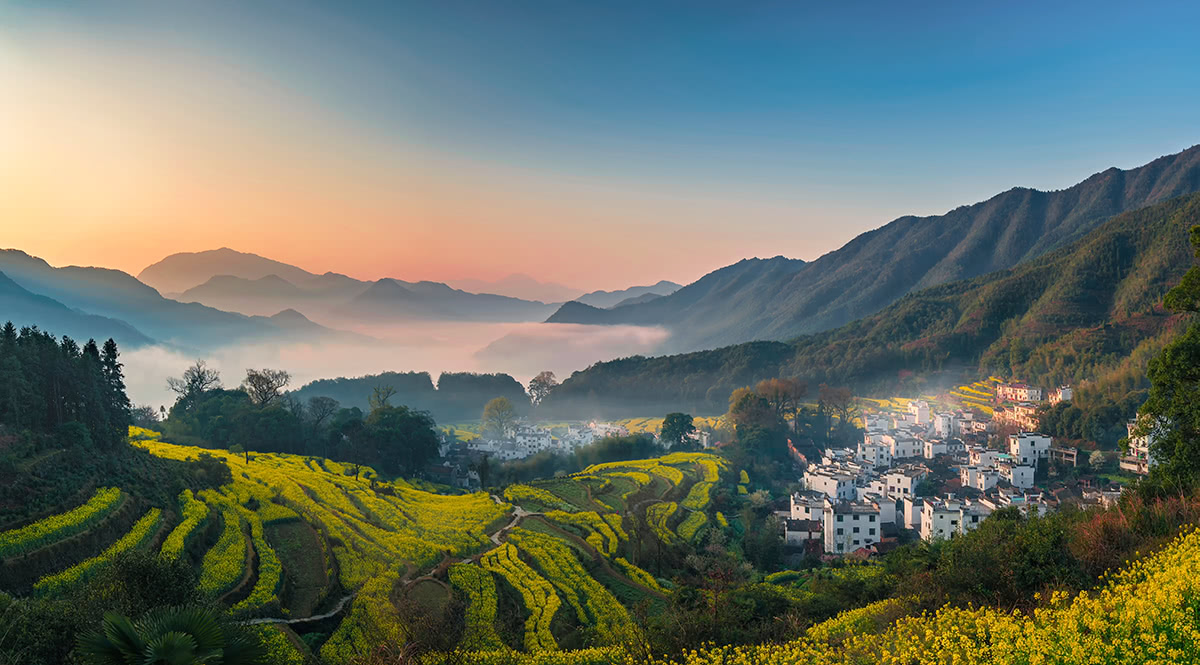
Wuyi Mountains.
Local Cuisine and Accommodation Nearby
When exploring the breathtaking landscapes of the Wuyi Mountains, indulging in local cuisine and finding the perfect place to stay can enhance your travel experience. Here’s a guide to savoring the flavors of the region and enjoying comfortable accommodations nearby.
Culinary Delights of Wuyi Mountains
The Wuyi Mountains are not only celebrated for their stunning natural beauty but also for their rich culinary heritage. Here are some must-try dishes and local specialties:
-
Wuyi Rock Tea (Da Hong Pao): Known for its unique flavor and aroma, this famous oolong tea is a highlight of the region. Visit one of the local tea houses to sample fresh brews.
-
Bamboo Rice: A traditional dish made by stuffing glutinous rice with a mix of meats and vegetables inside bamboo tubes, then steaming it to perfection. The bamboo imparts a subtle flavor that enhances the dish.
-
Stir-Fried Mountain Vegetables: The surrounding forests yield an abundance of fresh vegetables. Try seasonal dishes featuring wild greens, which are often lightly stir-fried with garlic and soy sauce.
-
Hakka Cuisine: Reflecting the region’s cultural diversity, Hakka dishes like stuffed tofu and pork belly with preserved vegetables offer a hearty taste of local traditions.
-
Wuyi Braised Pork: This dish features tender pork belly slowly cooked in a savory sauce, often served with rice and pickled vegetables—perfect for a filling meal after a day of exploring.
Accommodation Options
The Wuyi Mountains offer a variety of lodging options, ensuring a comfortable stay that caters to different preferences and budgets. Here are some recommendations:
Sangu Resort Area
Located just a short drive from the Wuyi Mountain Scenic Area, the Sangu Resort area boasts numerous hotels and resorts:
-
Wyndham Garden Wuyishan: A luxurious five-star hotel that offers modern amenities, beautiful views, and easy access to the scenic area.
-
Days Hotel by Wyndham Yinxiang Wuyishan: A reliable four-star option with comfortable rooms and a convenient location for exploring the mountains.
-
Wuyi Mountain Yiqu Xiangsi Alhu Resort Hotel: This charming mid-range hotel provides a cozy atmosphere, ideal for relaxation after your adventures.
Xingcun Village
For those looking to be closer to the Nine-Bend River and enjoy early morning activities, Xingcun Village is a fantastic choice:
-
Wuyi Mountain Jooch Resort Hotel: A five-star hotel that offers stunning views and excellent service, perfect for a luxurious retreat.
-
Jiaye Mountain House: Another upscale option, this hotel features beautifully appointed rooms and is only a short walk from the rafting pier.
-
Yuejiuqu Boutique Hotel Wuyishan: A stylish four-star hotel that combines comfort with local charm, making it a great base for your mountain exploration.
Final Thoughts
Whether you’re hiking through lush valleys, floating down the Nine-Bend River, or simply savoring the local delicacies, the Wuyi Mountains promise an unforgettable experience. With a range of delicious foods and comfortable places to stay, you’ll find everything you need to make your visit both enjoyable and enriching. Don’t miss the opportunity to immerse yourself in the local culture and hospitality while surrounded by one of China’s most stunning natural landscapes.
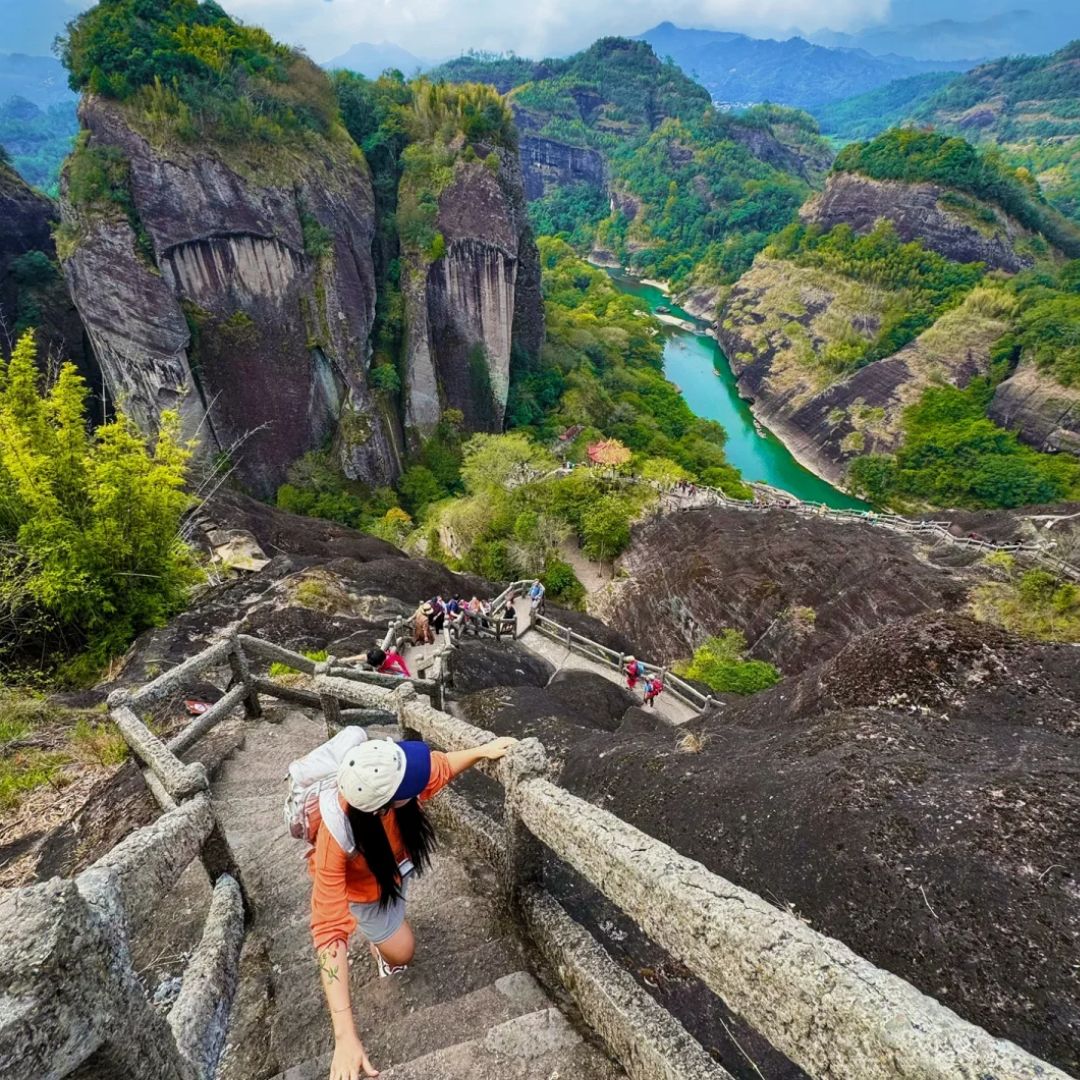
Wuyi Mountains.
Frequently Asked Questions
-
What is the best time of year to visit the Wuyi Mountains?
The Wuyi Mountains are beautiful year-round, but the best times to visit are during spring (late March to May) for blooming tea plantations and flowers, and autumn (September to mid-November) for vibrant red leaves. Summer offers lush greenery, while winter provides a serene atmosphere with foggy landscapes and occasional snow. -
How do I get to the Wuyi Mountains from major cities?
The most convenient way to reach the Wuyi Mountains is by high-speed train from cities like Shanghai (3½ hours), Hangzhou (2½ hours), and Xiamen (3½ hours). Alternatively, you can fly into Wuyishan Airport, which is only 12 km (8 miles) from the scenic area, though flight options are limited. -
What are the must-see attractions in the Wuyi Mountains?
Some top attractions include the Nine-Bend River for bamboo rafting, the stunning views from Tianyou Peak, the scenic One-Line-Sky area, and exploring the cultural heritage at Wuyi Palace. Don’t miss the Da Hong Pao Scenic Area, home to the famous Wuyi Rock Tea. -
How long should I plan to stay in the Wuyi Mountains?
A stay of 2 to 3 days is recommended to fully enjoy the natural beauty and attractions of the Wuyi Mountains. This duration allows you to experience the major scenic areas, partake in activities like bamboo rafting, and visit tea plantations. -
What types of accommodations are available near the Wuyi Mountains?
Accommodations range from luxurious 5-star hotels to budget-friendly hostels and inns. The Sangu Resort area and Xingcun Village are popular choices, offering a variety of options and convenient access to the scenic areas. -
Are there any entrance fees for the Wuyi Mountain Scenic Area?
Yes, entrance tickets for the Wuyi Mountain National Scenic Area are available in 1- to 3-day passes, with prices ranging from 215 yuan for a one-day pass to 250 yuan for a three-day pass. Additional fees apply for activities like bamboo rafting and visiting specific waterfalls. -
Is hiking in the Wuyi Mountains suitable for beginners?
Yes, many trails in the Wuyi Mountains are accessible for beginners, with moderate difficulty levels. While there are no cable cars, the hiking paths are well-maintained, allowing for a pleasant experience for all fitness levels. -
Can I participate in any cultural experiences while visiting?
Absolutely! Visitors can engage in tea tasting experiences, learn about the history of Wuyi Rock Tea, and explore traditional tea plantations. You can also visit historical sites such as the Yongle Buddhist Temple and Wuyi Palace to immerse yourself in the local culture.
Final Thoughts on Your Trip
As you prepare to bid farewell to the enchanting Wuyi Mountains, take a moment to reflect on the rich tapestry of experiences you’ve woven during your visit. From the breathtaking vistas of Tianyou Peak to the serene bamboo rafting along the Nine-Bend River, each corner of this UNESCO World Heritage Site has offered a unique glimpse into the beauty of nature and the depths of Chinese culture.
The harmonious blend of lush greenery, vibrant tea plantations, and ancient temples creates an atmosphere that is both tranquil and invigorating. Whether you’ve marveled at the majestic cliffs, savored the world-renowned Da Hong Pao tea, or simply found solace in the whispers of the wind through the pines, the Wuyi Mountains have a way of capturing the heart.
As you journey onward to your next destination, carry with you the memories of this remarkable landscape and the warmth of its rich heritage. May the spirit of adventure continue to guide you, and may your travels always lead you to places as awe-inspiring as the Wuyi Mountains. Safe travels!